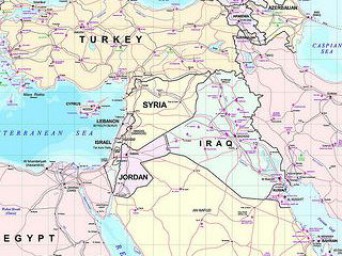One hundred years after the Sykes-Picot deal, the Luiss School of Government gathered in the classroom called ‘Toti’ the director of La Stampa Maurizio Molinari, the journalist and co-director of MACOM, a master offered by Luiss, Gianni Riotta, the director of the School of Government Sergio Fabbrini and the professor Massimiliano Panarari for a reflection on the middle eastern mosaic. What are today the failed middle eastern states? What can the world and Europe do to stop brutality? These are the starting questions of the seminary.
Maurizio Molinari rumbled talking about the Sykes-Picot deal, analyzing how the decisions took by France and UK at the end of the first world war about the Asia Minor’s asset are now collapsing. Syria, Iraq and Libya are just some of the states created by the deal that no longer exist; on whom there isn’t an institution that protects and supervises. In this situation of institutional degeneration, in a sunni universe, an ancestral and fundamentalist feeling arises, that craves for an again-pure Islam. The extremist propulsion, Molinari says, is not only the violent one used by the jihadists that we are accustomed to see on Tv. It is more about the pure identity of Islam, a thing that could also be found in the egyptian ideologist Hasan al-Sham’s “Muslims brothers”. An islamic organization with a political method towards Islam, that refuses the armed fight as a way to get the power. Between nation-states in decay and extremist groups in growth, there is the violent trend of Daesh that when claims to rule over Bilad al-Sham, the historic region of middle east, is supported by this principle of islamic identity. A principle, Molinari says, that will not fade with the decay of Daesh, but will reborn again in other shapes, as history teaches us.
Are we at the end?
Riotta said that we shall abandon the popular idea that, in a friend-enemy distinction, is essential to seek the guilty if we can’t explain the reason of a particular phenomenon. He said that, whether we like it or not, we must realize that a part of the world has declared war towards modernity. When we look at the middle eastern world, we understand it through our western premises, and we think that we can improve it, westernizing it. But what is clear by this analysis is that some aspects of this situation are mysterious, even if we suffer from their effects.
Sergio Fabbrini agrees with this, illustrating how the world order is now lacking of a centre; the failed middle eastern states are the perfect example of this, the failure of whole modernity. How to react to the decay of arab states? What role can Europe have? This are questions debated by geopolitical experts, in search for answers. Regarding this, Maurizio Molinari, first of all suggests to leave the categories of the past. He claims that when history hurries, our ability to understand sways and we have to study deeper in new ways the phenomenon. The only one that in this moment seems able to study the enemy, in order to act like him, is Vladimir Putin. The russian president understood that the only principle useful is deterrence. To be respected, the enemy has to know that “we” are strong and ready. We have to threaten without necessarily using force, following the latin principle si vis pacem para bellum. We also have to back those modernizing forces, primarily women, who live inside muslims countries fighting for rights. But, inside european countries, the containment policy can be achieved only through a real integration and through a common security pattern. Integration, Riotta said, will not avoid us some terrorists but will develop, in their neighbours, the sense of responsability, useful to cooperate with the security force. The warning written on the New York’s metro is “If you see something, say something”, a useful advice in this time of crises.
